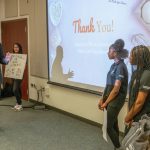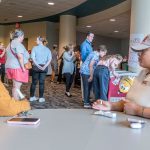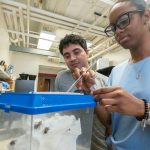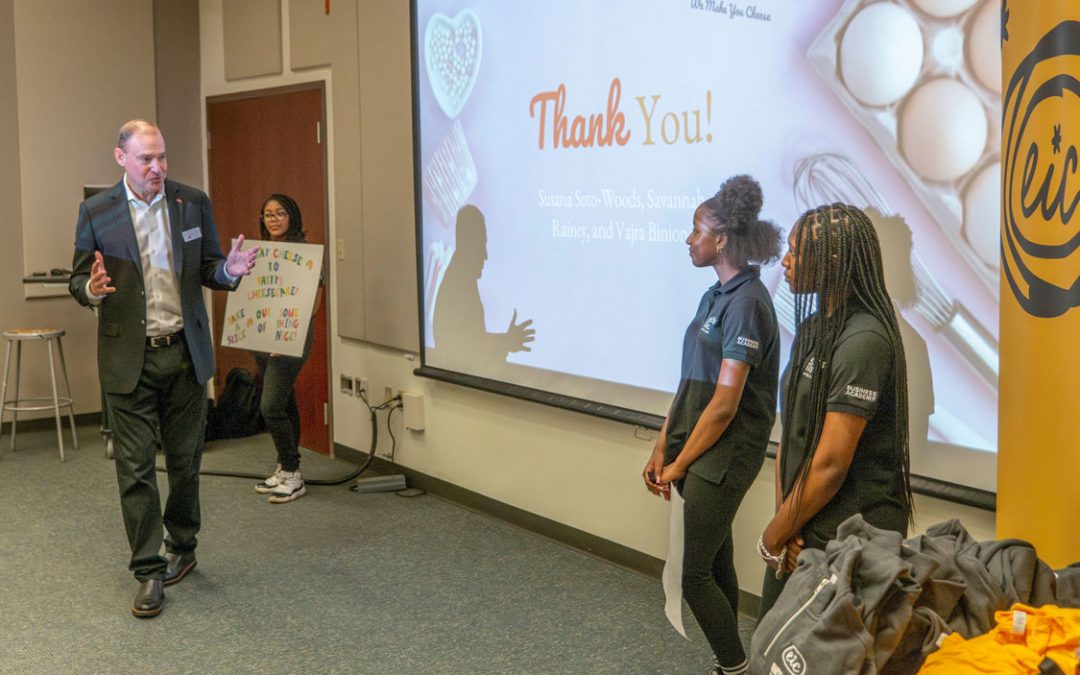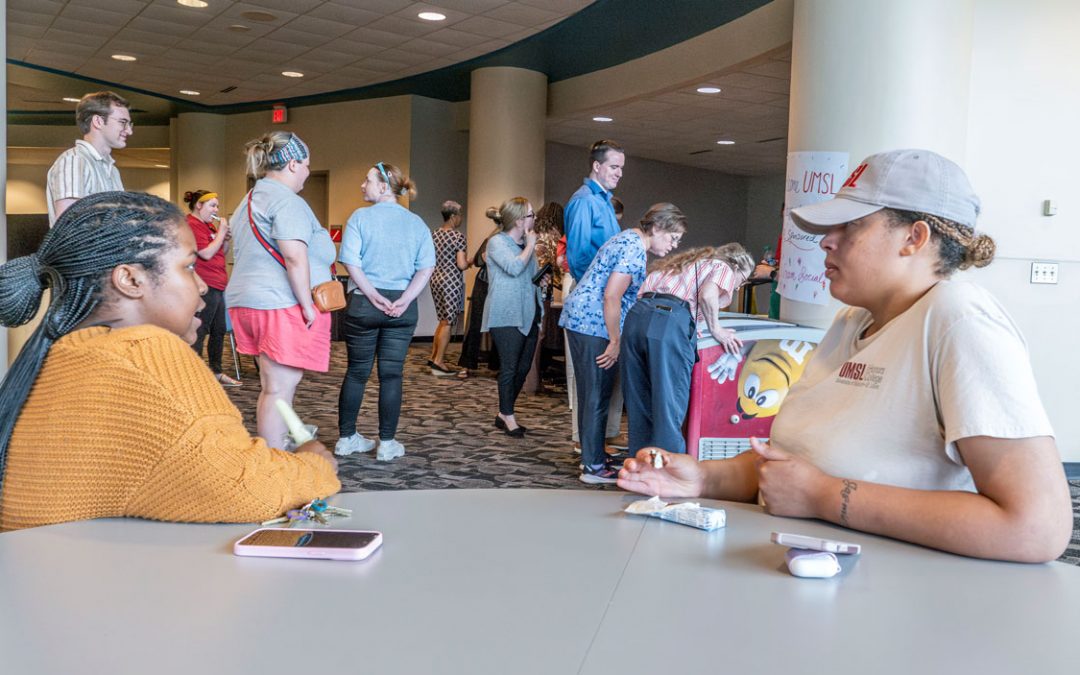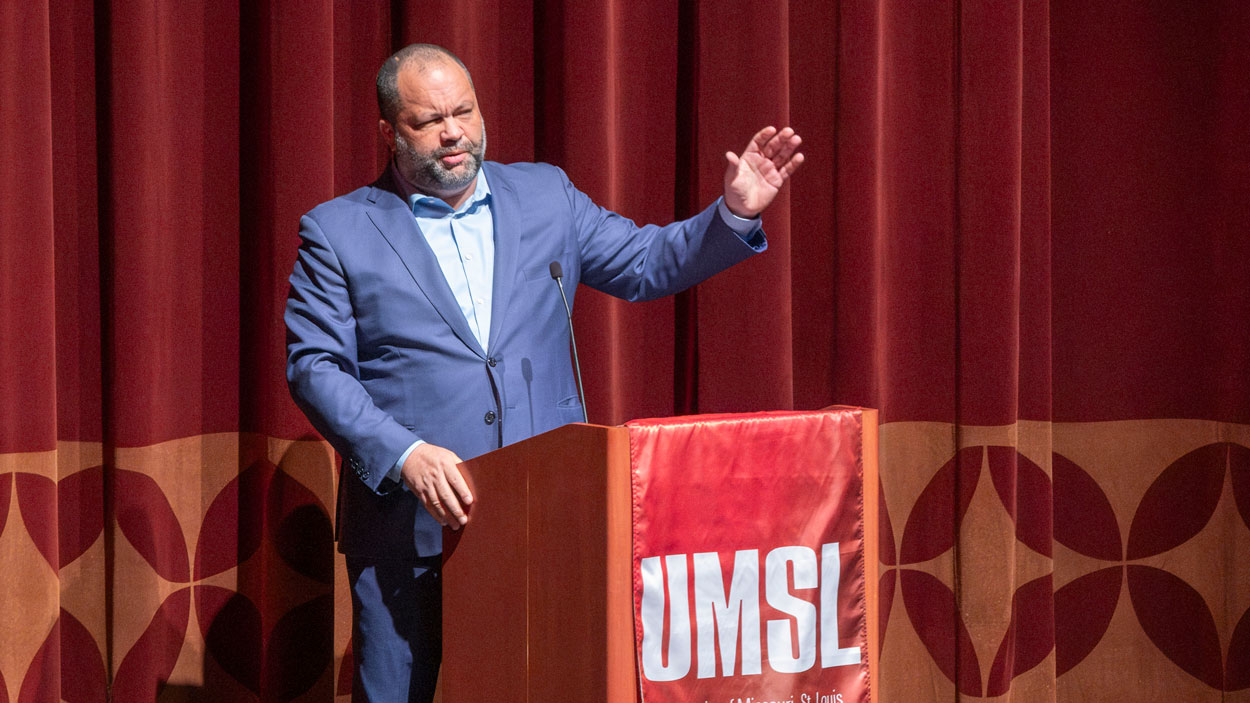
Benjamin Jealous, former president of the NAACP and executive director of the Sierra Club, delivered the keynote address at UMSL’s 2024 Dr. Martin Luther King Jr. Holiday Observance. (Photos by Derik Holtmann)
Martin Luther King, Jr. delivered his final sermon, “Remaining Awake Through a Great Revolution,” on March 31, 1968, from the Canterbury Pulpit at the Washington National Cathedral in Washington, D.C.
In the address, given days before his assassination in Memphis, Tennessee, King said the country faced a challenge closely entangled with racial injustice: poverty. He called attention to the 40 million Americans living in poverty at the time, from the ghettos of the North to the rural South to Appalachia.
It was time, he said, for the nation to fulfill its obligation to the poor: “This is America’s opportunity to help bridge the gulf between the haves and the have-nots. The question is whether America will do it. There is nothing new about poverty. What is new is that we now have the techniques and the resources to get rid of poverty. The real question is whether we have the will.”
Benjamin Jealous, former president of the NAACP and executive director of the Sierra Club, drew inspiration from those words as he delivered his keynote speech, “The Other Lost South: MLK, Forbidden History and Rebel Hope,” during the University of Missouri–St. Louis’ annual Dr. Martin Luther King Jr. Holiday Observance at the Blanche M. Touhill Performing Arts Center on Monday.
Touching on the event’s theme of “Economic Justice: Honoring Dr. King’s Legacy and Fight to End Economic Inequality and Poverty,” Jealous highlighted the country’s history of using race to create division and a forgotten history of economic solidarity as he delivered a 30-minute speech to an audience of more than 200 people in the Anheuser-Busch Performance Hall.
Jealous began by reminding the audience of the country’s origins as a British colony.
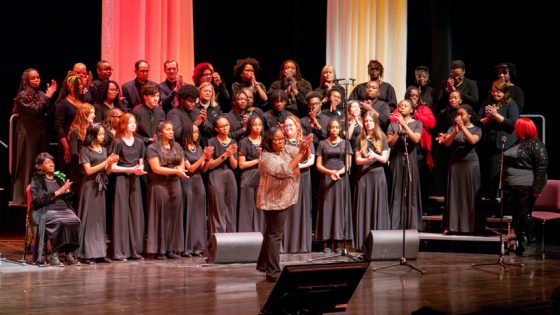
Maria Ellis (front center), an UMSL music education alum, gestures for the audience to clap while leading the combined Sheldon’s All-Star Chorus and UMSL Voices of Jubilation.
“It doesn’t matter which poor colony you go to – India, places in the Middle East, Ireland, America – the strategy was always the same: divide and conquer,” he said. “Because in the beginning in the colony, the colonists, those who were actually working for the king, are there for one reason – to extract wealth. And they are vastly outnumbered. So, you divide the Sunni against the Shiites. You divide light-skinned Indians against dark-skinned Indians. You divide Catholic against Protestant. And you divide European against African here in America. Because in Virginia, in the early days, 90% of the people in the colonial population were either African slaves or European indentured servants.”
To that end, the colonial powers redefined the word “race,” assuring European Americans that, no matter how low their station, they were still above enslaved Black people. Thus, the American caste system was born.
However, in investigating his own family’s history, Jealous stumbled across the forgotten history of economic and racial solidarity in the face of that division. He then recounted the history of the Readjuster Party to the audience.
The party was founded in Virginia in the wake of Reconstruction and was a bi-racial coalition made up of former Confederates and freedmen, who sought to reduce the state’s Civil War debt, promote public education and to break the power of the planter class. For a time, the party was largely successful in achieving its aims.
“This history wasn’t taught in Virginia until about 20 years ago,” Jealous said. “They ripped it out of the history books. As soon as they did, this movement was put down by disinformation, a call to white supremacy and a ruthless violence.
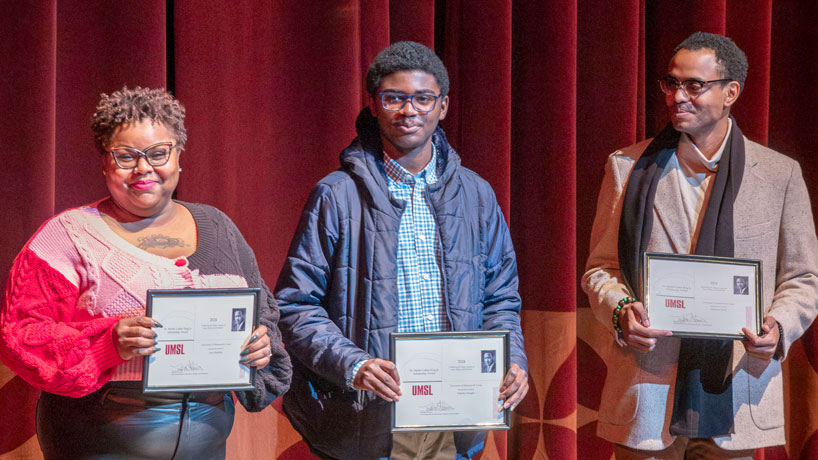
UMSL students Lecia Hopkins, Chijioke Onuigbo and Olajuwon Davis are recognized as the recipients of the Dr. Martin Luther King Jr. Scholarship.
“But before that, they came together – former Confederate soldiers and freedmen. They took over the Virginia state government. They took over the governorship and took over both legislatures. They appointed both U.S. senators. They saved the free public schools. They built the great land grant institutions of Virginia. They radically expanded Virginia Tech to be the working-class white person’s answer to the more patrician UVA. They created what would become Virginia State University, the first publicly supported training institution for teachers south of the Mason-Dixon. They would quadruple the number of Black teachers in Virginia in four years. They abolished the whipping post. They abolished the poll tax. They drove the state from a deficit into a surplus by taxing the old plantation owners. And then they were destroyed.”
Jealous said the Readjuster Party – despite its deliberate omission from history books for decades – echoed King’s mission not only to end racial injustice but also economic inequality. He urged everyone to take steps to continue working toward inclusive prosperity.
“Understand that there is no day like today to start acting with more courage to ensure inclusive prosperity for all actors,” Jealous said. “This country is fragile. It’s only been a small number of us who have led the fight to keep the American Dream alive. Right now, the very people who want you to believe that it’s impossible to unite this country are those who profit most from a state divided.”
UMSL music education alum Maria A. Ellis kicked off the celebration by leading the Sheldon’s All-Star Chorus and the UMSL Voices of Jubilation in renditions of “Lift Every Voice and Sing” and “Lovely Day.”
Brittany Radford, McCausland site director for the Gathering and board member of Bridge Bread, served as the master of ceremonies for the annual event, which also featured remarks from Vice Chancellor for Diversity, Equity and Inclusion Tanisha Stevens and Chancellor Kristin Sobolik as well as a recognition of UMSL’s three Martin Luther King Jr. Scholarship recipients, Olajuwon Davis, Lecia Hopkins and Chijioke Onuigbo.




